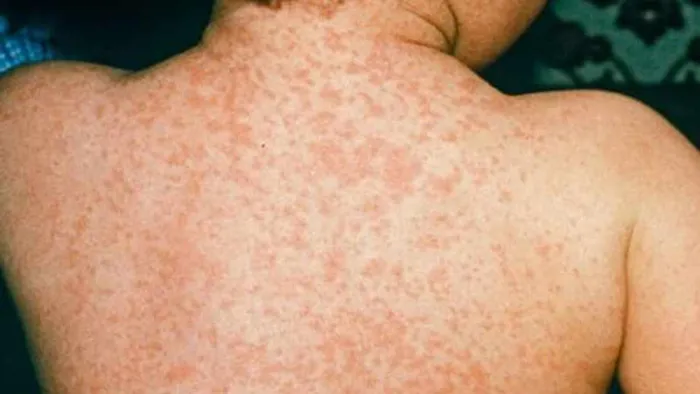
The number of measles cases has surged across SA.
Image: Lindsey Wasson/ Reuters
Wendy Jasson da Costa and Tracy-Lynn Ruiters
SOUTH Africa is facing a sharp rise in measles cases, leaving thousands of children vulnerable as declining vaccination coverage creates gaps the virus can exploit. Multiple outbreaks have been reported across Gauteng, the Free State, Limpopo, Mpumalanga, North West, the Northern Cape, and the Cape Town Metro.
The National Department of Health (NDoH) confirmed the flare-ups this week but emphasised that people who completed their childhood vaccination schedule do not need to be revaccinated. Foster Mohale, the department's spokesperson, said children in the public sector should receive two doses of the measles vaccine, delivered as the Measles Rubella (MR) shot at six months and again at 12 months.
“The outbreaks are due to sub-optimal vaccine coverage rates and possibly some waning of immunity in vaccinated children,” Mohale said.
The National Institute for Communicable Diseases (NICD) has confirmed the growing number of cases. Its data shows that in the first 45 weeks of 2025 - just over nine months - there were 1 795 laboratory-confirmed cases of measles, with 114 new cases reported in the past week alone. Gauteng is the worst affected province, with 745 cases confirmed to date. The Western Cape reported 52 new cases around mid-October, while the KwaZulu-Natal Department of Health said yesterday that it does not have a measles outbreak.
In June, the Gauteng Department of Health (GDoH) reported cases in Tshwane, with hotspots in Mamelodi and Winterveld, as well as cases in Johannesburg, Ekurhuleni, and the West Rand. At the time, the GDoH found that immunisation coverage for the second dose of the measles vaccine remained below 75% in both Johannesburg and Tshwane, “significantly below the level required to prevent outbreaks.”
Shimoney Regter, from the Western Cape Department of Health and Wellness, said the province was concerned about the recent rise in measles cases. Between 1 January and 8 November 2025, the Western Cape recorded 282 laboratory-confirmed measles cases, mostly in the Cape Town Metro, with no deaths reported.
“This increase is not unique to the Western Cape. South Africa is experiencing a decline in childhood vaccination uptake, which poses a serious risk to public health and threatens the country’s efforts to eliminate vaccine-preventable diseases,” Regter said. She added that this decline has contributed to outbreaks of measles, rubella, and diphtheria across the province, signalling serious gaps in population immunity.
Regter explained that routine childhood immunisation coverage has dropped significantly. For children under one year in the Western Cape, coverage fell to 67.4% in 2024/25, down from 67.6% in 2023/24, far below the 95% target needed for herd immunity. She attributed the decline to disruptions during the Covid-19 pandemic and vaccine hesitancy driven by misinformation. “Lower coverage weakens herd immunity, making outbreaks more likely,” she said.
To address this, the department has implemented an early warning and response system, including targeted vaccination outreaches in high-risk areas such as Khayelitsha, Mfuleni, Eerste River, Somerset West, Mitchells Plain, Kraaifontein, and Wesbank. A nationwide measles vaccination campaign is underway from 3–28 November, with health teams aiming to close immunity gaps through mass immunisation, strengthened surveillance, and community outreach.
The NICD noted that measles is endemic in South Africa and tends to rise during autumn and spring. Health authorities again urged parents to ensure their children are fully vaccinated, warning that even small drops in immunisation coverage can undo years of progress in controlling vaccine-preventable diseases.
In 2022, the World Health Organization declared measles an “imminent threat in every region of the world,” noting that nearly 40 million children missed at least one vaccine dose in 2021 due to reduced access to healthcare during the Covid-19 pandemic. The WHO also highlighted that measles is more infectious than the Omicron COVID-19 variant, with nine million cases a year causing 128,000 deaths.
Symptoms typically appear 10–14 days after exposure and include a prominent rash, runny nose, coughing, red and watery eyes, and small white spots inside the cheeks. The rash usually begins on the face and upper neck, then spreads to the hands and feet within 7–18 days. Complications can include blindness, encephalitis, severe diarrhoea and dehydration, ear infections, and severe breathing problems, including pneumonia.
While measles cases are cause for alarm, rubella infections are also on the rise, with 1,698 cases detected nationally by week 45.